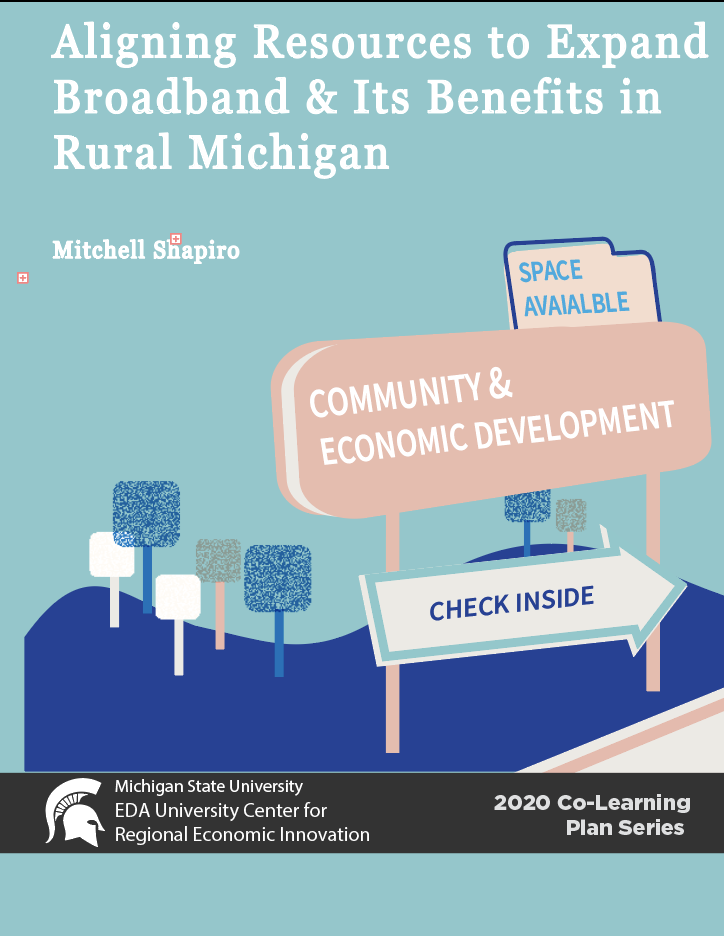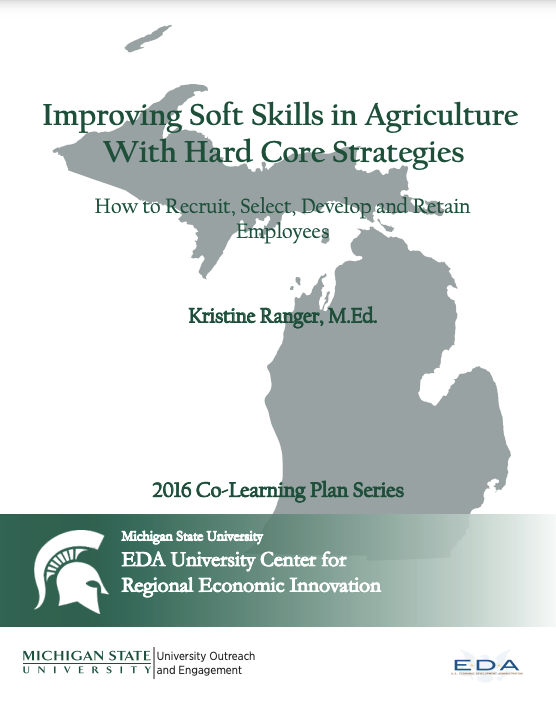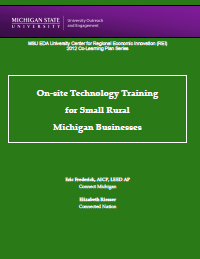Discovering and applying new and innovative economic development tools, models, policies, and programs
Creating Jobs and Wealth in Distressed Michigan Communities
Digital
-
2025: Train-the-Trainer (T3) (UDM)
Author(s): Dr. Phillip OllaRead the Report About the ProjectBuilding on the REI-funded initiative Future-Proofing Detroit: Bringing AI Upskilling to the Neighborhoods, this student-led, faculty-guided Train-the-Trainer (T3) project will expand AI literacy efforts in partnership with the Mama Akua Community House in Detroit’s Zone 8 neighborhood. The project will prepare a cohort of up to 10 grassroots trainers, including students, residents, and local agency staff, to independently deliver AI micro-workshops within their communities. Using the “Learn it, See it, Do it” (LSD) model, participants will receive hands-on instruction, guided practice, and real-time feedback. This scalable, community-embedded approach promotes digital equity, workforce readiness, and entrepreneurial innovation among Detroit’s ALICE populations, supporting long-term economic adaptation through sustainable, localized delivery.
-
2025: Investigating AI's Role in Enhancing Community-Based Coalition Effectiveness
Author(s): Jon WillowRead the Report About the ProjectWillow’s original fellowship aimed to analyze the potential of AI tools to address critical challenges in coalition building and organizational collaboration, with a specific use-case focus on the Michigan Highspeed Internet (MIHI) office’s MITTEN regions. With the elimination of non-deployment BEAD funding, her focus shifted to supporting the development of robust and flexible internal AI governance policies for local governments and community-based nonprofits.
-
2025: Future-Proofing Detroit: Bringing AI Upskilling to the Neighborhoods
Author(s): Dr. Phillip OllaRead the Report About the ProjectThis project aims to provide residents of Zone 8 in Detroit with AI literacy and skills to improve their job prospects and economic stability. In partnership with the University of Detroit Mercy and Mama Akua Community House (MACH), the initiative seeks to deliver practical, neighborhood-based training on AI tools and applications, focusing on areas like sales, marketing, and content creation.
The goal is to help residents, including small business owners and workers, use AI to streamline tasks and improve efficiency, making them more competitive in today’s workforce. The project will engage participants through micro-learning modules and workshops with training developed in collaboration with local residents to ensure it meets their needs. The program also includes plans to create an “AI Upskilling Toolkit” to support scalability and share best practices with other communities. The ultimate goal is to build a more resilient and inclusive workforce while supporting Detroit’s economic development priorities.
-
2020: Aligning Resources to Expand Broadband & Its Benefits in Rural Michigan
Author(s): Mitchell ShapiroRead the Report About the ProjectFollowing up on his REI co-learning plan examining issues and strategies related to the potential for rural electric cooperatives (RECs) to help bridge the digital divide, Mitchell’s Innovation Fellowship will focus on aligning a broad range of stakeholder resources to more effectively expand broadband and its benefits in rural Michigan. This will include the state’s RECs as well as its regional planning association (RPOs), local governments and community anchor institutions (CAIs). The project will also support efforts to effectively leverage the expertise and longstanding Michigan-focused experience of Connected Nation Michigan, as well as the recently launched Michigan Moonshot project. The Moonshot project is a statewide effort to expand rural broadband led by Merit Network, a nonprofit university-owned network operator that has been providing high-performance communication services to the state’s educational and CAI community for more than 50 years.
-
2019: Electric Cooperatives and the Digital Divide: Helping Connect Rural Americans to 21st Century Opportunity
Author(s): Mitchell Shapiro, Independent ConsultantRead the Report About the ProjectThe task of bringing high speed Internet to America's rural communities remains a challenging and painfully unfinished one, aggravating the existing economic and social divides these communities face. To help address this challenge, certain rural energy cooperatives (RECs)—including three in Michigan—have begun deploying high-speed fiber optic networks to better connect their members. This project examines the experience of these pioneers and related factors to develop a body of information, analysis, and recommendations to inform strategies aimed at expanding broadband, and the benefits it can bring to underserved rural communities.
-
2018: Network and Digital Media Strategies for Community Development Efforts: A Case Study of The Southwest Michigan Planning Commission
Author(s): Laleah Fernandez, Michigan State UniversityAbout the ProjectThis project will focus on a digital media strategy for The Southwest Michigan Planning Commission (SWMPC) to improve awareness, consensus building and action, related to current topics of policy importance for economic development. In particular, this project will include a network analysis to help optimize the flow of information (e.g. remove redundancy), specify influencers/opinion leaders, and improve communication efficiency based on strength of ties and attributes among stakeholders. The project will result in a case study research paper and digital media outreach template for other regional economic development organizations.
-
2016: Exploring the Use of Virtual Human Resource Services to Improve Farm Profitability
Author(s): Kristine Ranger, The Learning ConnectionRead the Report About the ProjectProgressive farm managers often find themselves managing people as much or more than they manage animals and equipment. This dramatic change for farm owner/managers is very challenging because most have little experience and no education in the management of critical human resources. Rural economic development and the future success of Michigan farms depends on the availability of resources and technical assistance that is readily available to these operations. This Co-Learning Plan will explore the use of Virtual Human Resources Services for dairy farmers, including the use of phone coaching, virtual farm orientation or onboarding courses, the use of employee and employer handbooks and templates, improved hiring practices, and the need for Spanish versions of HR material.
-
2014: Upper Peninsula Economic Development Data Collection and Marketing Project
Author(s): Jennifer James-Mesloh, Northern Michigan UniversityRead the Report About the ProjectThis economic development data collection and marketing project stemmed from the collective focus of two organizations, LSCP and UPCDC, which determined that business attraction and marketing were needed for the 15 Upper Peninsula (U.P.) counties. Business attraction and marketing are capital and time-intensive endeavors, requiring resources typically unavailable to economic developers in the U.P. Thus, the LSCP was charged with facilitating a regional-wide effort to create digital and hardcopy material aligned with the International Economic Development Council's (IEDC) site- selection data standards. The information collected was later converted by the LSCP into individualized marketing pieces for each county in the region.
Project Updated As Of September 30th, 2014
-
2012: The WebPolis Consortium
Author(s): Norman Tyler, Institute for Geospatial Research and Education, Eastern Michigan UniversityRead the Report About the ProjectA varied array of local economic development policies and programs are available to local Michigan communities, but local leaders can be confused about how they can be utilized in their own community. One way to solve for this was through use of online resources. A suite of online applications for use by local governments was developed by faculty at Eastern Michigan University in conjunction with test communities and is known as the CityHallCommons (formerly WebPolis) Consortium. The available applications include a community discussion forum, online surveys, real estate financial analysis, loan and grant search engine, and a template for an online community newsletter. One of the most requested modules for the CityHallCommons Consortium was a local economic development application. This experience offered them a hands-on opportunity to better understand this knowledge through assisting in the development of a significant tool of local economic development.
Project Updated As Of September 30th, 2012
-
2012: On-Site Technology Training for Small, Rural Michigan Businesses
Author(s): Eric Frederick, Connect Michigan; Elizabeth Riesser, Connected NationRead the Report About the ProjectConnect Michigan has been leading the way to bring the economic and quality of life benefits of broadband to all Michigan residents. This report explored the opportunity for hands-on, on-site technology training for Michigan small businesses and suggests a model for local implementation.
Project Updated As Of September 30th, 2012











